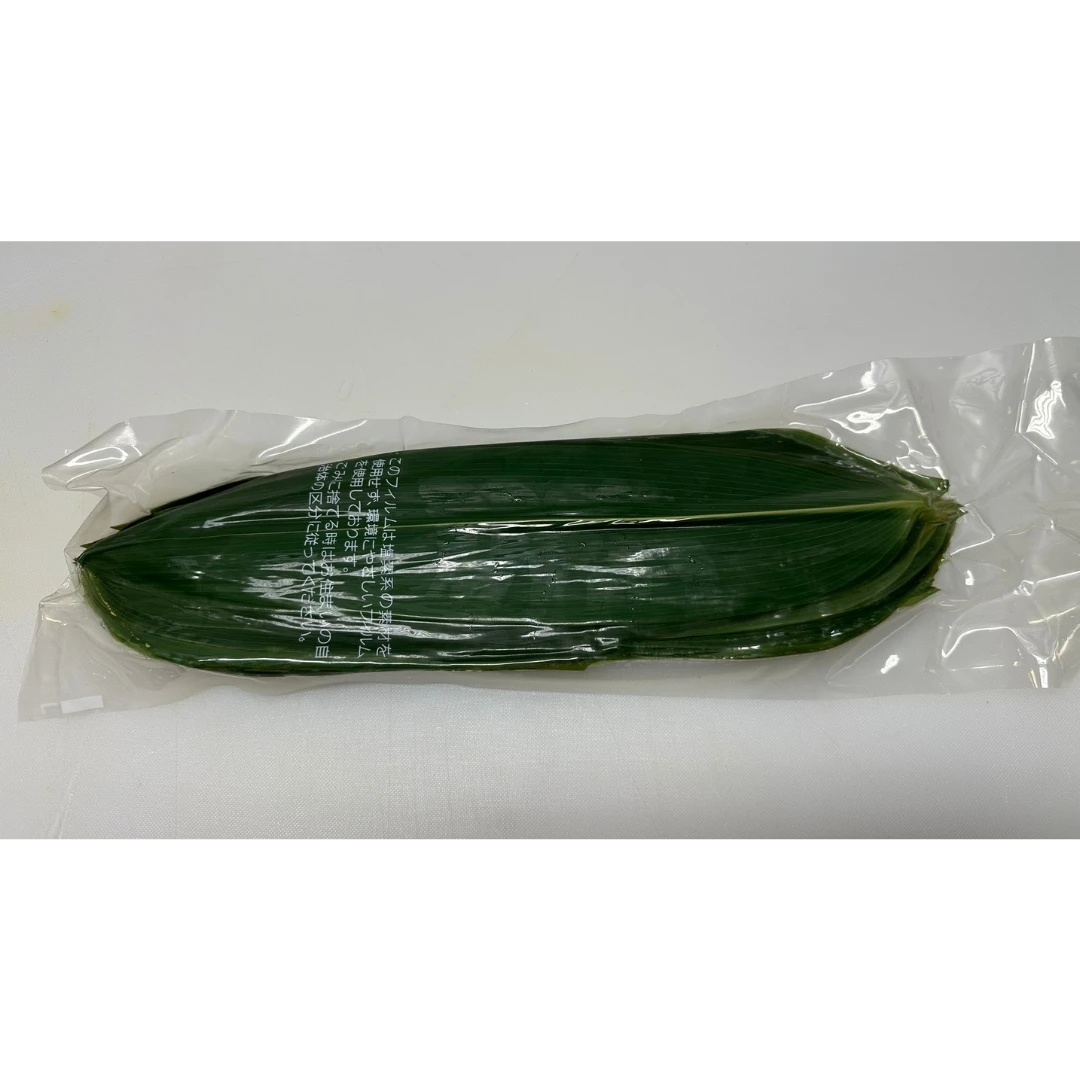SASANOHA - BAMBOO LEAVES - Sasa kurilensis

Description
笹の葉 SASANOHA - BAMBOO LEAVES - Sasa kurilensis
Location
Tokushima
Size/Weight
400g per pack (Actual Weight May Vary)
100 pc
Texture/Flavor Profile
Sasanoha features a firm, fibrous texture that provides a unique visual and tactile element to culinary presentations. While not intended for direct consumption, the leaves impart a subtle, earthy aroma that can enhance the overall dining experience when used in plating. Their glossy dark green surface adds an aesthetic appeal, elevating the presentation of any dish.
Availability/Seasonality
Bamboo leaves are available year-round, with peak freshness noted during the late spring and early summer months. Native to the Kurile Islands and Sakhalin, Sasa kurilensis thrives in temperate climates, making it accessible for chefs and caterers looking to incorporate this beautiful foliage into their culinary creations.
About
Sasa kurilensis, commonly known as bamboo leaves, is the northernmost-growing bamboo species in the world. Known for its resilient nature and stunning appearance, it serves as an excellent decorative element in Japanese cuisine. The leaves can grow up to 10 inches long and 3 inches wide, creating a lush backdrop for sushi, sashimi, and other presentations, symbolizing the beauty of nature.
Preparation
While not consumed, Sasanoha can be creatively used to wrap, line, or decorate dishes. Soak the leaves briefly in water to make them pliable, and then use them to line plates or platters, providing an elegant backdrop for a variety of culinary presentations. They can also be used to wrap fish for steaming, infusing the dish with a subtle aroma.
Nutritional Value
Although not meant for eating, bamboo leaves have antioxidant properties and may contain beneficial compounds. Their primary role is aesthetic rather than nutritional, enhancing the overall presentation of dishes.
Selection and Storage
Choose vibrant, fresh leaves free from blemishes or discoloration. Store them in a cool, dry place, ideally wrapped in a damp cloth to retain moisture. When properly cared for, Sasanoha can last for several days, allowing chefs ample time to utilize their decorative potential.
Summary
Sasanoha offers a striking and aromatic addition to any culinary presentation. With its elegant appearance and subtle fragrance, bamboo leaves are a beautiful choice for chefs looking to elevate their dishes and create memorable dining experiences.
Location
Tokushima
Size/Weight
400g per pack (Actual Weight May Vary)
100 pc
Texture/Flavor Profile
Sasanoha features a firm, fibrous texture that provides a unique visual and tactile element to culinary presentations. While not intended for direct consumption, the leaves impart a subtle, earthy aroma that can enhance the overall dining experience when used in plating. Their glossy dark green surface adds an aesthetic appeal, elevating the presentation of any dish.
Availability/Seasonality
Bamboo leaves are available year-round, with peak freshness noted during the late spring and early summer months. Native to the Kurile Islands and Sakhalin, Sasa kurilensis thrives in temperate climates, making it accessible for chefs and caterers looking to incorporate this beautiful foliage into their culinary creations.
About
Sasa kurilensis, commonly known as bamboo leaves, is the northernmost-growing bamboo species in the world. Known for its resilient nature and stunning appearance, it serves as an excellent decorative element in Japanese cuisine. The leaves can grow up to 10 inches long and 3 inches wide, creating a lush backdrop for sushi, sashimi, and other presentations, symbolizing the beauty of nature.
Preparation
While not consumed, Sasanoha can be creatively used to wrap, line, or decorate dishes. Soak the leaves briefly in water to make them pliable, and then use them to line plates or platters, providing an elegant backdrop for a variety of culinary presentations. They can also be used to wrap fish for steaming, infusing the dish with a subtle aroma.
Nutritional Value
Although not meant for eating, bamboo leaves have antioxidant properties and may contain beneficial compounds. Their primary role is aesthetic rather than nutritional, enhancing the overall presentation of dishes.
Selection and Storage
Choose vibrant, fresh leaves free from blemishes or discoloration. Store them in a cool, dry place, ideally wrapped in a damp cloth to retain moisture. When properly cared for, Sasanoha can last for several days, allowing chefs ample time to utilize their decorative potential.
Summary
Sasanoha offers a striking and aromatic addition to any culinary presentation. With its elegant appearance and subtle fragrance, bamboo leaves are a beautiful choice for chefs looking to elevate their dishes and create memorable dining experiences.







